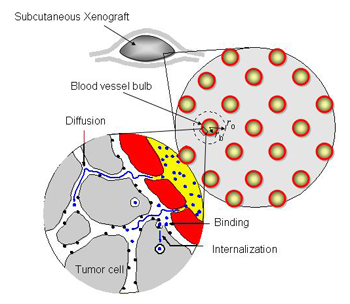
A Florida State University faculty member who uses computational techniques to evaluate a new class of cancer-killing drugs is attracting worldwide attention from other researchers.
Kevin C. Chen, an assistant professor of chemical and biomedical engineering at the Florida A&M University-Florida State University College of Engineering, is using high-powered computers to determine how substances known as recombinant immunotoxins can best be modified in order to attack and kill malignant tumors while doing minimal harm to a patient’s healthy cells.
“Cancer is a disease of tremendous complexity, so the analysis and interpretation of data demands sophisticated, specialized computational methods,” Chen said of his research.
Recombinant immunotoxins, Chen explained, are new drugs that are being tested in clinical trials for certain types of cancer therapy. They consist of tiny fragments of antibody proteins that are fused at the genetic level to toxins produced by certain types of bacteria, fungi or plants.
“Once injected into the body, the antibody portion of the immunotoxin targets specific proteins, called antigens, that are massively expressed on the surface of cancer cells,” Chen said. “These cells are subsequently killed by the accompanying toxins. Normal, healthy cells, meanwhile, are not recognized and thus are spared.”

That is the theory, at least. In practice, Chen acknowledges that numerous factors can decrease the immunotoxins’ effectiveness. Among them:
- The large size of some immunotoxin molecules can hinder their ability to move to the targeted location to bind readily with cancer cell proteins, leading to efforts to reduce their size.
- The immunotoxin molecules’ stability in the bloodstream and in the extracellular matrix can affect their length of time in circulation and in tumor tissues, respectively, thereby determining their effectiveness at killing the optimal number of cancer cells.
- The rate at which immunotoxins bind with malignant cells and the relative amount of antigens expressed on the cell surface are especially critical factors, because an imbalance in those two factors may result in over-bombardment of a single cancer cell with excessive numbers of immunotoxins, leaving many other cancer cells unharmed. The opposite scenario also is possible: If not enough immunotoxins bind with malignant cells, too few cells will be killed with each dose.
“Because the level of anticancer drug doses that can be given to any patient is limited by immunogenicity—the immune response that results—it is essential to explore how the efficacy of recombinant immunotoxins can be enhanced without resorting to escalating doses,” Chen said. “Our computational research has enabled us to quantify and develop models describing many of the factors that influence immunotoxins’ behavior in the body. This is essential knowledge that cancer researchers and doctors must have in order to take the next steps forward in developing immunotoxin drugs that might one day be approved as a standard treatment for cancer patients.”
Working with FSU postdoctoral researchers Junho Kim and Xinmei Li and molecular biologist Byungkook Lee of the National Cancer Institute in Bethesda, Md., Chen recently published a paper summarizing the team’s work. “Modeling Recombinant Immunotoxin Efficacies in Solid Tumors” appeared in the March 2008 issue of the peer-reviewed journal Annals of Biomedical Engineering. An abstract of the paper can be accessed online at www.ncbi.nlm.nih.gov/pubmed/18183487.




